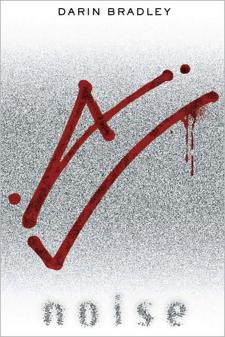I recently read Noise by Darin Bradley and was completely blown away by it. I got so sucked into the narrative that at times a part of my mind was screaming at me to stop ignoring the book and start acting on what it was telling me. But I’m getting ahead of myself.
Noise is the story of Hiram and Levi, who are training for the downfall of society. They are guided by the anarchic Salvage movement that is spreading its messages on the now unused radio airwaves. They have written a survival book—called The Book—that is equal parts Boy Scout handbook and Anarchist Cookbook. The story is told through Hiram and Levi’s actions and also through the text of The Book.
Publishers Weekly called the book an “exceptionally polished debut” and I have to agree. Full disclosure, I’ve published short fiction by Bradley, so it shouldn’t be a surprise that I like the way he writes. But this is different from his short fiction. This book has power. As I said earlier, there were times reading Noise where I wanted to gather up my family and get out. Often I struggle to stay within a book when reading and can get distracted easily. That didn’t happen with Noise.
John Klima: Where did the idea for Noise come from?
 Darin Bradley: When I was in graduate school, working on a degree in literature and literary theory, I became fascinated by cognitive theory. Eventually, it became my concentration, and I did a dissertation about selfhood and its portrayals in speculative fiction.
Darin Bradley: When I was in graduate school, working on a degree in literature and literary theory, I became fascinated by cognitive theory. Eventually, it became my concentration, and I did a dissertation about selfhood and its portrayals in speculative fiction.
While I was learning all of this, I spent the majority of my time thinking about how situational selfhood is—how one’s environment determines one’s consciousness. I started to think about how my own “self” would change if, say, society fell apart and everything became kill-or-be-killed. I knew that I certainly wouldn’t spend my time tending to academic ideas about my own existence. I’d be farming, or fighting, or running for my life. That doesn’t leave a lot of room for pondering big questions.
So, I wrote up this document, “The Book” within the novel, about how to survive—how to protect one’s sense of self in a collapsing world. It ended up being an instruction manual for how to create your own dystopia.
After that, I settled on a story about identity and loss, and the collapse of society became the perfect metaphor for how to negotiate the crumbling of one’s personal reality.
John Klima: What is Salvage Country?
Darin Bradley: Salvage Country is, simply, a promotional website. When I started thinking about what kind of content I wanted to accompany the book, in a way that wasn’t your run-of-the-mill link farm and excerpt party, Salvage was the obvious choice. In the novel, Salvage is the name for the underground hive-mind that convinces itself that a collapse is imminent, before it happens. They become fixated on how to survive and build your own nation-state, and they communicate their ideas through analog broadcasts, graffiti, and other subversive means. That created a fun opportunity to give people an idea of what the book is about without simply putting up a site and shouting, “Hey, look at my book!” By creating my own versions of the pirate broadcast messages, vandalism, and other artifacts that Salvage uses, I was able to create a website with its own narrative.
For example, here’s a video that I did in Salvage-broadcast style (with Jeff VanderMeer’s help—that’s his voice work), even though it’s a tiny, tiny documentary about Salvage, not a message between Salvagers:
Noise, by Darin Bradley—teaser trailer #2 from Darin Bradley on Vimeo
Salvage Country is full of things like this—some video, some audio, some image-based—and it does a better job of communicating what Salvage is like than I could do with pages upon pages of explanation. I’ve been told it’s a pretty creepy package.
John Klima: What are you working on next?
Darin Bradley: I’m writing a bona fide dystopian novel. Noise doesn’t really fit neatly into any utopian, dystopian, or anti-utopian category (it’s all three), and I still have ideas to explore that fit within this mode. It isn’t a direct sequel to Noise, but I consider it a thematic one.
It’s decidedly more science fictional than Noise, and it’s a hell of a lot harder to write.
John Klima edits the Hugo Award-winning Electric Velocipede. The next issue features a story from Darin Bradley called “∞°” (pronounced infinite mo) and is filled with more bibliographic meta-fiction than your average story.










